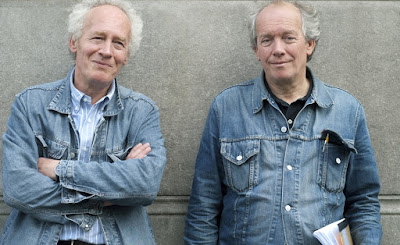A uniquely disturbing (because it is so plausible) movie,
THIS IS OUR LAND (originally titled as the better, simpler and more ironic
Chez Nous) shows us, bit by bit, how a smart, caring, well-liked nurse in a typical provincial French town is slowly and cleverly conned into running for mayor under the banner of the "new" far-right party and its leader (think
Marine Le Pen).
Though the far right, along with its neo-Nazis cohorts, has yet to win the major election in France, as Donald Trump and the Republican Party have done here in the USA, their strength in France -- as well as all across the European community -- continues to grow.
Belgian filmmaker
Lucas Belvaux (of
38 Witnesses and
Rapt) who co-wrote (with
Jérôme Leroy, from his novel) and directed the movie has given it a remarkably true-to-life, near-documentary-like approach filled with so many on-the-nose details of small town life -- at work, at home, in relationships with friends and lovers -- that reality is captured almost at once and remains grounded throughout, despite some melodramatic turns and a finale that seems too sudden, coincidental and easy. The movie's strengths far outweigh its weaknesses, however, and what is likely to remain with you is a cautionary tale
par excellence.
In the leading role is that fine Belgian actress
Émilie Dequenne (above and on poster, top), who began her career in the
Dardennes'
Rosetta and has been giving crackerjack performances during the near 20 years since. This is another of her best, and it is hard to think of an actress (maybe
Adèle Haenel in a few years) who could be any better in this role.
What the movie is particularly good at is showing us the route, led by a very successful right-wing doctor, played with his usual
savoir faire by
André Dussollier (above), via which the national front party seduces our heroine, along with so much of the populace, many of which are interested in populist ideals but unable (maybe unwilling) to differentiate between those and the racist, xenophobic underlay that accompanies them.
Catherine Jacob's performance -- the actress is shown above and below, center -- as the Le Pen stand-in is impressive in both its subtle conniving and its power to rouse the masses.
This Is Our Land is also quite adept at demonstrating how a smart and caring woman could be seduced by this combination of praise, attention, and the support of friends already in the hands of the far right. In fact, what makes the film so particularly disquieting is how heavily we identify with our nurse/heroine and then must watch as she (and, yes, maybe
we would, too) begins compromising the very bedrock principles upon which she has lived so far.
Now, all political parties do this same thing (god knows, America's Democratic Party compromised what few principles it had left by forcing Hillary Clinton upon us rather than going with the more progressive candidate whose appeal, according to all the early polls, trumped even that of Trump. But there are bad political parties and worse ones. And the French right-wing, along with America's Republicans, are clearly the worse.
The film's wild card is the character of the Dequenne character's old boyfriend (
Guillaume Gouix, above and below) who suddenly appears back in her life as a possible mate. Alternately violent and kindly, the latter especially to her children, he quickly becomes as much of a problem for the party and their candidate, as he may be for our heroine, too.
In the supporting cast,
Patrick Descamps (above, left) is particularly notable as Dequenne's layabout Communist-Party father, whose reaction to her new political affiliation will not surprise you. A movie that is, as they used to say, ripped from today's headlines,
This Is Our Land seems not to be asking
could-it-happen-here? (it already has) than simply to be questioning how, in this "modern" age, we might hang on to whatever is left of our minuscule democracy.
From
Distrib Films US, in French with English subtitles and running 117 minutes, the movies gets its U.S. theatrical premiere this Wednesday, April 18, in New York City at
Film Forum. On April 27 it opens in Los Angeles at
Laemmle's Monica Film Center. Click
here, and then scroll down and click on
Watch Now to view all upcoming playdates, cities and theaters.





























































